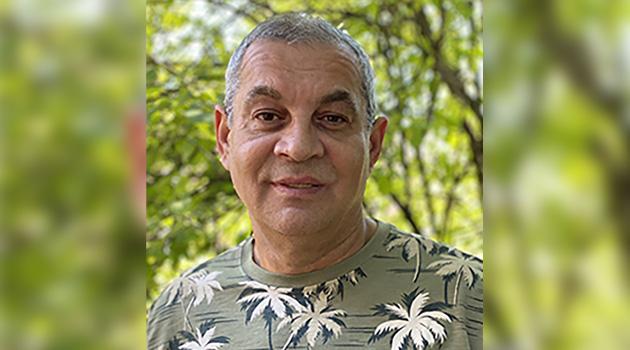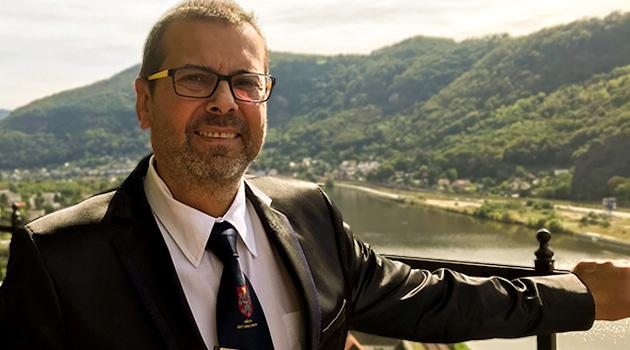Czech regional elections: Ninth-place Romani candidate says housing and lack of representation are the community's biggest problems

News server Romea.cz has ascertained that at least seven members of the Romani community are running in this year’s regional elections nationwide. This is the third in our series of interviews with them (previous interviews are here and here).
Marcel Fabián Grünza is running for the “Change for the People and the Landscape” (Změna pro lidi a pro krajinu) movement in the Liberec Region in ninth place on the list. The entrepreneur has dedicated himself to social work for years and opened a drop-in center in Liberec.
According to Grünza, access to housing is the biggest problem for Romani people in the Liberec Region. “Every week, eight or 10 Romani families contact me and I aid them with finding an apartment to lease. Frequently I have to vouch for them to landlords who do not want to rent to Romani families,” he told news server Romea.cz.
Q: Why have you decided to run for the Změna (Change) movement?
A: People from that movement want the same thing I do, and that is change in the Liberec Region. I like their program, which focuses on improving the quality of life for residents in the Liberec Region and on protecting the environment. I like the fact that they want to work for the people and have no prejudices against any groups.
Q: Why should voters choose you in particular?
A: By running, I want to change people’s opinion of us Roma, because not every Romani person is necessarily problematic. It’s not just the media that have long distorted the image of Romani people, though. The public loves getting carried away with these populist promises and slogans from politicians like Okamura, and that’s bad. Personally, I want to focus on social inclusion, because I have many years of experience with that from the Liberec Forum (Liberecké fórum), a nonprofit organization.
Q: What outcome do you anticipate?
A: I’d give my candidacy a 50-50 shot.
Q: Where do you see the biggest problems of the Liberec Region?
A: In Liberec there is no problem with Romani unemployment, most Roma are employed here because we have industrial zones and job opportunities. Our region is specific in that way. However, I see the biggest problem as being the Regional Authority’s own indebtedness. When the Civic Democratic Party (ODS) was in government here, our region got into debt and sold off its assets to different entrepreneurs. That is why there is now a desperate lack of social housing in our region. People have nowhere to live, housing is becoming increasingly unaffordable. This is not just a problem for Romani people. Members of the majority society, people living with disabilities, those disadvantaged in other ways all have problems finding housing here. It may be true that change for the better is underway in our region, but it’s going slowly. The problem has to be addressed more systematically, apartment units must be rebought by the Regional Authority, the conversion of non-residential spaces for housing must begin, old, unused buildings and houses must be reconstructed. Those could then be offered to families whose incomes are low and to people in need of housing. We need to expand the capacity of the available apartment units, but our housing policy has been rather passive up to now.
Q: What bothers Romani people the most in your neighborhood?
A: Access to affordable housing. I address this day in and day out, elections or no elections. I run a construction firm, a nonprofit organization, and I hold an annual festival, so I know many people. Actually the biggest problem here is affordable housing. Every week, eight or 10 families contact me and I aid them with finding an apartment to lease. Frequently I have to vouch for them to landlords who do not want to rent to Romani families.
Q: Would that situation be resolved by the new law on affordable housing that the Czech Regional Development Ministry is planning to submit to the Government in December 2021?
A: The lack of national legislation on social housing is felt by every region in the country, there are no exceptions. That law, as previously submitted, did not address absolutely everything, but it was a kind of potential tool for municipalities and Regional Authorities. However, even if it had passed, it would not have covered the situation of the most impoverished and most vulnerable, because under that law the applicant for a social apartment was not allowed to be in debt, not even to owe a local authority a back fee for waste disposal services, for example. That group of people would not have met the conditions to be awarded social housing even if that law had been adopted, because they do owe such debts.
Q: Roughly two years ago Liberec closed down two residential hotels because the city leadership decided not to support the trafficking in poverty they involved. Was that the right decision, in your view?
A: At that time some of the people who had been living in those residential hotels migrated into Jablonec, Tanvald, and other surrounding towns. The rest did their best to move into the other residential hotels that remain open to this day, because they had no other option. Even a common family from the majority society is frequently unable to own their own home here, and the people in the residential hotels do not have the equivalent of two or three monts’ rent in the bank so they can live in a leased property. On the one hand it is an attractive thing to do, to close down the residential hotels, but then we have to think about the families who were living there and who suddenly had nowhere to go. For Romani people it’s even worse, because even if you happen to be an assiduous, hardworking person, nobody will lease an apartment to you just because you are Romani, or your name sounds Romani. The doors are closed to Romani people 80 or 90 % of the time.
Q: You’re the chair of the Liberec Forum organization – how are you managing to integrate the socially vulnerable into society?
A: We begin with the children whom we tutor, we have a children’s group called Kytička (Bouquet). We also aid long-term unemployed people with finding jobs, though. In collaboration with a different organization, we address collections proceedings and indebtedness. You can’t help somebody find work until their debt is under control. A change is needed to the social benefits law in terms of that fact, because if you have a family on welfare who have collections proceedings weighing on them, those benefits immediately stop once the husband is employed. The collections agent garnishes his wages and the family has almost nothing left over to live on. It would be ideal to recalculate the welfare in such a case so the family would receive an amount proportional to what was still needed, like they do in Germany. That is the only way to get out of debt. In the interim, the interest on those obligations skyrockets. Being employed and paying your debts has to make financial sense, people have to end up better off after doing so.
Q: How do Romani people view the regional elections?
A: The Roma do not vote. I don’t know how to change that. I have done my best, more than once, to visit families and explain the importance of elections to them, but I have not succeeded. This is not just a problem among Roma, though, even majority society people don’t cast ballots, low turnout testifies to that.
Q: How do you explain that?
A: People show no interest in elections or in politics in general. They are not interested in what is happening in their own town. They are disgusted by politics. That’s a shame, because if Romani people would cast ballots for Romani candidates, they would have their own representation in the Regional Assembles and there would be a bigger chance of change. As things are, they have nobody there to defend their interests.
Q: Ahead of the autumn elections the subject of COVID-19 is rocking society again. Do you believe the pandemic poses a threat to turnout?
A: We can certainly count on that. Turnout has long been low and now it will be even lower. My personal assessment is that turnout will fall, compared to the last regional elections, by 8 %. People will be afraid to go to the polling places. That can be concluded from what you see if you go around town today – the streets are half-empty.
Q: Is there anybody on the political scene with whom you would not form a coalition government, if you win?
A: We would never form a government with either the Communist Party of Bohemia and Moravia (KSČM) or “Freedom and Direct Democracy” (SPD).
